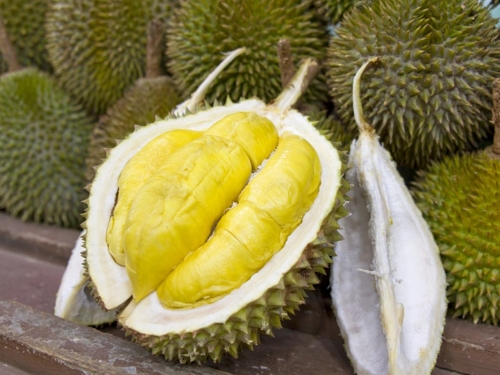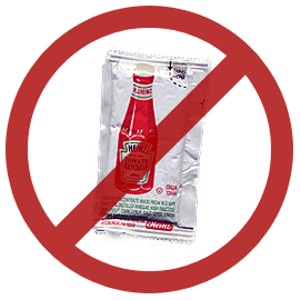The food newswires carry stories almost weekly about foods being banned. When the bans effect our own countries, we take note. Otherwise, they don’t get much media coverage. But it’s educational to look at food bans we would consider odd…
 A Durian: Smells like something that’s been dead for a week…
A Durian: Smells like something that’s been dead for a week…
Life goes on…
Folks in my homeplace – Ontario, Canada – just accept the fact that we can’t order a burger cooked rare (for health safety reasons). Likewise, we can’t buy raw (unpasteurized) milk. And dairies can’t sell milk products from cows which have been given Bovine Growth Hormone. That’s just a small sample of foods and food additives banned here. And those bans are all based on hard medical and nutritional science.
Nevertheless… Life goes on as usual.
But other jurisdictions have banned foods we deem common and safe. And it’s eye-opening to discover why…
Kebabs
These classic Levantine skewered meat dishes are banned in Venice Italy. And it has nothing to do with the way they’re made, or what they’re made with. It’s just that the Venetian powers-that-be have decided Kebabs are too lowly a food to represent their unique city properly. Kebabs are associated with street food culture. And that doesn’t fit with Venice’s carefully cultivated image as a fine dining destination.
Chewing Gum
Again, it’s not a ban based on ingredients or health hazards. In Singapore, gum was banned because it posed a serious litter problem. Gum has been banned there since 1992 – except if you can show you have a doctor’s prescription for it. Ban offenders may be liable to fines of up to (US)$100,000 or 2 years in jail.
Durian Fruit
The large, spiky-skinned pod-like fruit is a favourite in many Asian cuisines. The trouble is, it smells like something that died a week ago. Until, of course, you cook it properly. The odour is pervasive, and can upset the neighbours. Thus, it has been banned in – you guessed it! – Singapore.
Samosas
Samosas are little triangular pastry packets filled with ground meat, potatoes, onions and, sometimes, other veggies. It’s a staple in India and surrounding countries. But they’re banned in Somalia. Why? Not because of what they’re made of, but what they look like. The country’s Islamic rulers decided to ban samosas because their three-cornered shape was too similar to the Christian symbol for the Holy Trinity.
Vegetarian Meals
Really? In France, yes. Specifically, the French government has banned vegetarian options on school lunch menus. They’re excluded under new nutrition guidelines the country published in 2011, which ban non-meat proteins in school lunch dishes. As you might expect, a lot of vegan and vegetarian families were disappointed, calling the move a step backwards.
Ketchup
Also banned in French schools, for ‘cultural’ reasons. France is well-known for it’s jealous pride in its national cuisine, which has been used as the basis for the cuisines of other countries across the western world. French lawmakers were concerned that ‘masking’ the flavour of food with ketchup would harm children’s palates, making it harder for them to appreciate ‘fine’ French cuisine.
Soy Beans
“Oh, c’mon!” I hear you moaning. Really? But it’s true. The issue is genetically modified (GMO) varieties of the cheap, prolific plant protein source. They’re banned in Austria, Hungary, Bulgaria, Greece and Luxembourg. And that’s meant that most US and Canadian soy bean growers – who have gone to GMO varieties to increase crop yields – can’t export to those countries any more. Fortunately for the growers, there are plenty of other countries who welcome their produce.
Hot Dogs
Okay. I know there are folks out there who feel Hot Dogs should be banned simply because they are a nutritional abomination. But that’s an unfair accusation when used in reference to the best of the dogs out there, which are all-beef and low fat, and are low in salt and other additives.
But the United Arab Emirates don’t care what they’re made of. The issue that prompted the ban there was an epidemic of childhood obesity. A 2014 study revealed that 14 percent of elementary school kids in the Emirates were overweight. So the UAE’s rulers banned hot dogs, sugar-sweetened sodas and salty fried snacks in an effort to counter the trend.
Beluga Caviar
Not that a ban on the crazy-expensive fish-egg condiment would effect most of us average folk at all… But the so-called ‘black gold’ of the caviar world – coveted Russian Beluga, from the Black Sea – is banned in the US. It’s not a culinary or nutritional exclusion. It’s an enviro-political ‘statement’ by the government. So strong is the worldwide demand for caviar that the sturgeon, which are harvested solely for their eggs, are becoming endangered. And there’s the issue of cruelty, on top of that. Not unlike the the reasons for the ban on Foie Gras…
Salt and Pepper
I heard your jaws drop when they hit the floor. But it’s true. And there’s a good reason. Salt and pepper are banned aboard the International Space Station. Because, in a weightless environment, there’s no way to successfully ‘sprinkle’ them on your food. Instead, their tiny, gritty grains scatter all over the place, and get into the instruments and mechanical systems. And that could be disastrous. Instead, astronauts are given salt- and pepper-infused water, in sealed pouches, to squirt into the pouches much of their food comes in.
My take
It should come as no surprise that some food bans are based on political issues. Animal-rights and bio-diversity advocacy is a huge and powerful industry today. But that’s not to say the advocates’ concerns are not valid. I agree that the caviar harvest, and force-feeding geese to fatten up their livers – just to feed the whims of rich food snobs – are cruel and wasteful.
But I roll my eyes when I read about purely political food bans based on religious symbolism or public-image worries.
I’m glad I live in a country and culture that takes a relatively liberal, non-political position on food bans. Our lives are richer and happier for it.
~ Maggie J.

